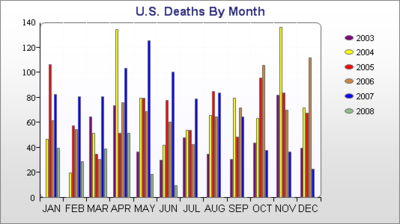This week, over objections raised by the four military service chiefs, Secretary of Defense Robert Gates signed a new version of the National Defense Strategy. This document, second only to the President's National Security Strategy, outlines how the Army, Navy, Air Force, and Marine Corps should plan and prepare for future wars.
The document, though still classified, reportedly directs the military to plan for more Iraq-like missions, instead of the conventional wars it has historically prepared for.
With America fighting two wars in Iraq and Afghanistan, it may seem perfectly reasonable to direct the military to use current conflicts as the basis for future plans. After all, the U.S. military purged itself of counterinsurgency knowledge in the aftermath of the Vietnam War, and Secretary Gates has rightly pushed officers to pay more attention to critical capabilities like advising and training foreign militaries – skills that directly apply to the wars in Iraq and Afghanistan.
Advocates for focusing on counterinsurgency capabilities will often argue that "the enemy has a vote," and thus America's military leaders must focus on how an adversary will most likely choose to fight us. These advocates are correct in their belief that future wars will most likely include plenty of urban combat, improvised explosive devices, and the need to understand local populations.
But what often gets lost in the debate is the fact that America chose to go to war in Iraq. Whatever one may think of the war, it was clearly one of choice, not necessity. Iraq did not pose an imminent threat to the United States, and Bush administration officials decided to use force in order to prevent Iraq from becoming a future threat. The distinction is important. The war in Iraq was not foisted upon America by providence, but was rather a specific decision – one that looks ever more dubious over time. Do Americans really think that more Iraq-like conflicts are in the national interest?
The United States is a global superpower without equal. States such as China, Russia, and India are rising, but they do not pose anywhere near the kind of military threat the Soviet Union did. Ever since 9/11, many of America's leaders seem to be acting as if we are under siege. We are not. To a significant degree, the United States can chose when, where, and how to fight its wars.
Whatever one may think of the Iraq War, it is clear that Americans are not willing to engage in more Iraq-like conflicts. Such wars, inevitably requiring a long-term military presence on foreign soil, do not play to America's strengths, but directly to our weaknesses.
There is no doubt that the U.S. military needs to focus more resources on developing the capabilities to succeed in Afghanistan and Iraq, but using the current conflicts as a basis for developing America's future fighting forces contains significant risks that deserve a public debate.
America needs to be better prepared for counterinsurgency, but planning for more Iraq-like wars of choice threatens to become a self-fulfilling prophecy.





